Why Russia is losing this war?
First I'll discuss why Russia *is* losing. Then I'll give my version of how it could happen. The key to understanding lies in the Soviet/Russian military doctrine. It gives context for current events and helps to predict further Russian actions🧵
First I'll discuss why Russia *is* losing. Then I'll give my version of how it could happen. The key to understanding lies in the Soviet/Russian military doctrine. It gives context for current events and helps to predict further Russian actions🧵

Maps of Russian Federal News Agency show a massive retreat. Apparently, Russia abandoned its initial plans to capture Kyiv and take control of Ukraine. Thus political goals of Z-operation can't be achieved. Regime change and (partial?) annexation of Ukraine are not gonna happen 
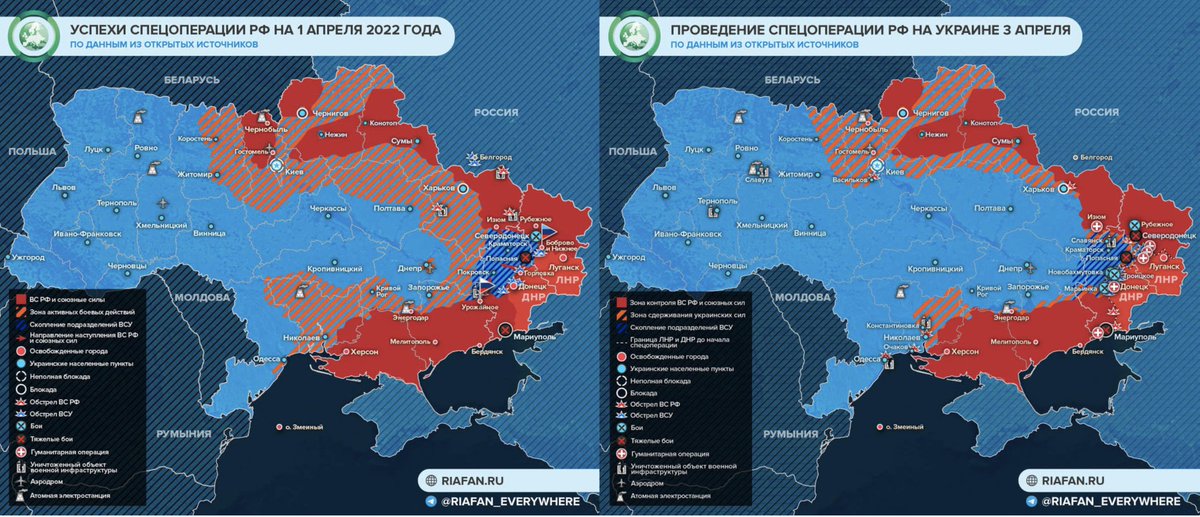
What is even more interesting, the tone of description has changed . As you see, until April 2 they had been posting maps of "successes (успехи) of the Special Operation". Since April 2 - of its "execution" (проведение). Indeed, this rapid retreat doesn't allow to claim success 

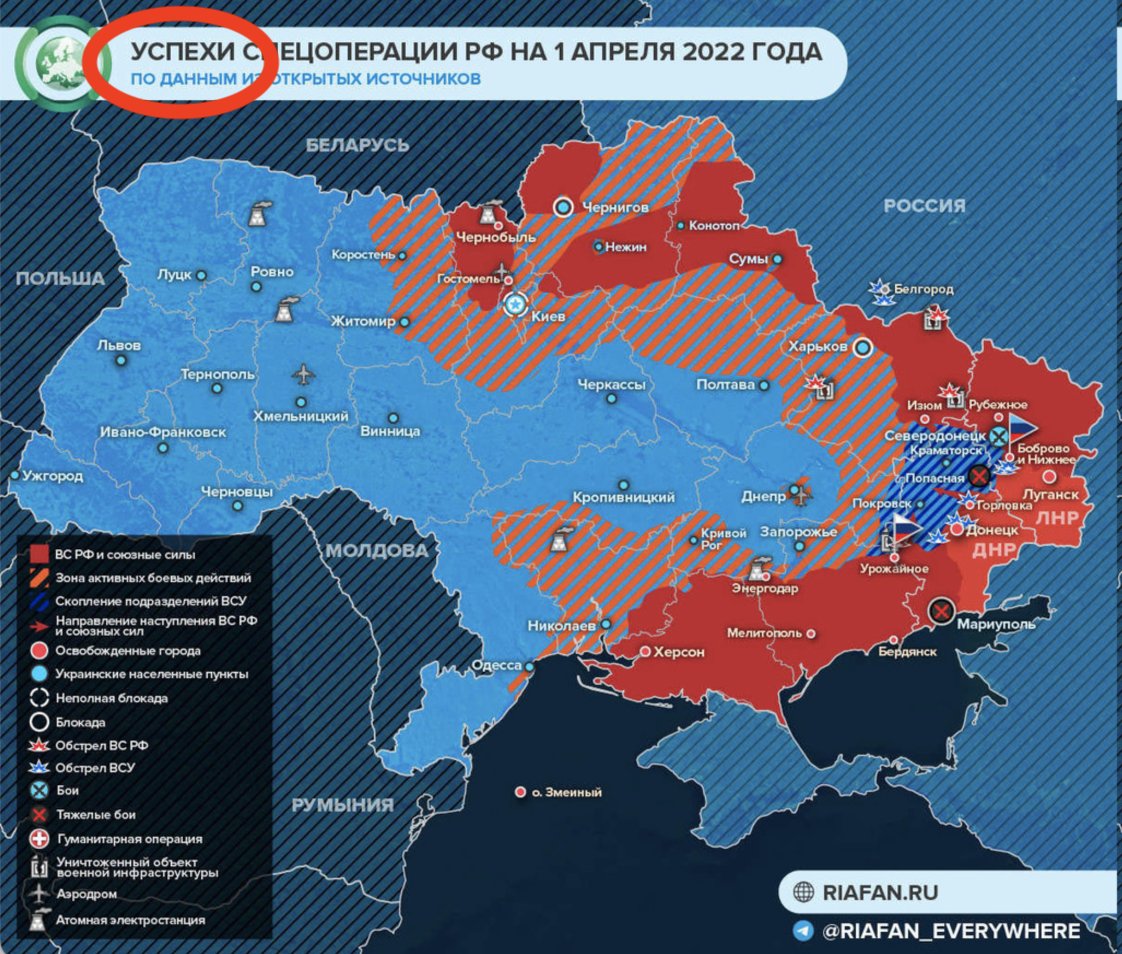
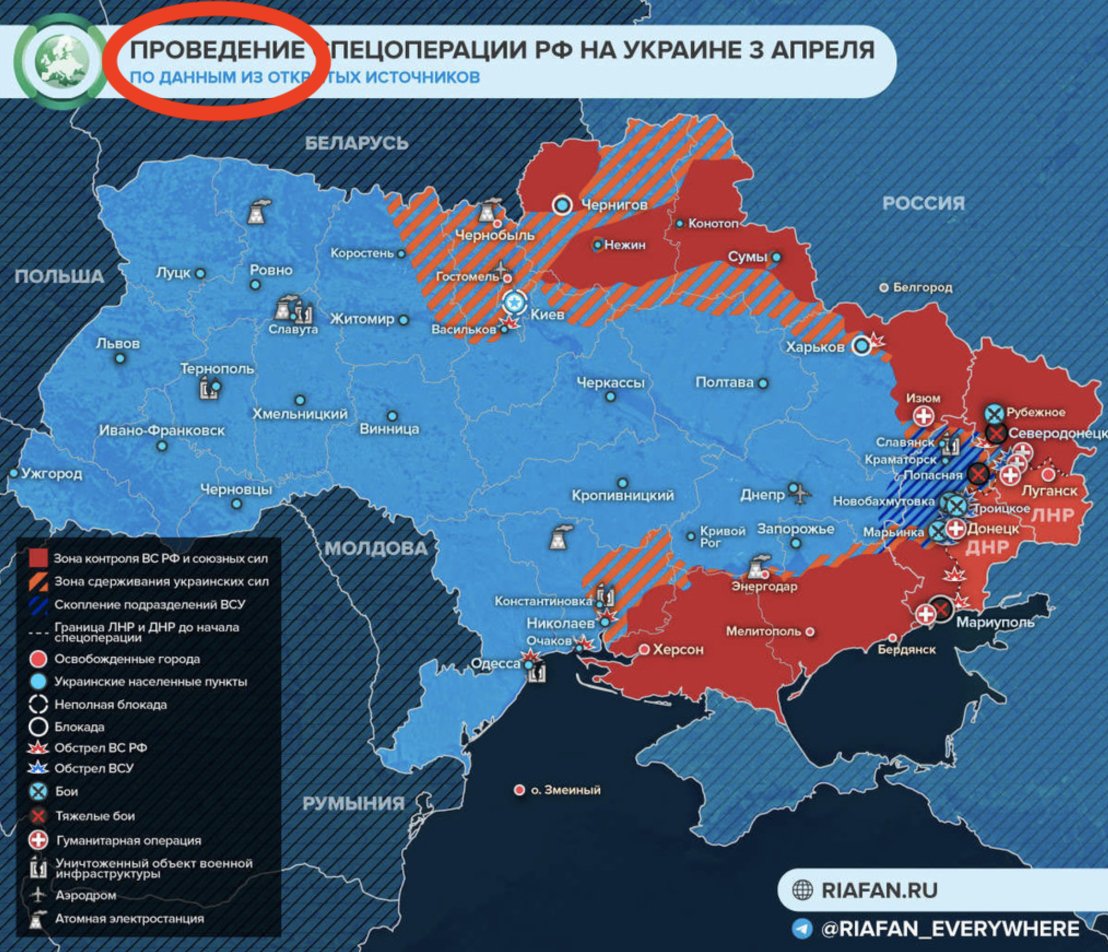
How did Russians explain the retreat? Colonel General Fomin told:
"We decided to radically, for several times decrease our military activities on Kyiv and Chernihiv directions. We assume that Kyiv will take corresponding decisions and create conditions for future cooperation"
"We decided to radically, for several times decrease our military activities on Kyiv and Chernihiv directions. We assume that Kyiv will take corresponding decisions and create conditions for future cooperation"
That doesn't mean deescalation however. PRmaxer Shoygu reported that the first stage of Special Operation is "successfully completed". Military capacities of Ukrainian army weakened and thus Russia can concentrate its effort on its main goal - "liberation of Donbass" 

Some already congratulated Russia with its success, concluding that "the goals of Special Operation were more limited than we had thought". That's a textbook copium. The initially declared Z-goal has not been achieved, thus whatever has been achieved is portrayed as the real goal 
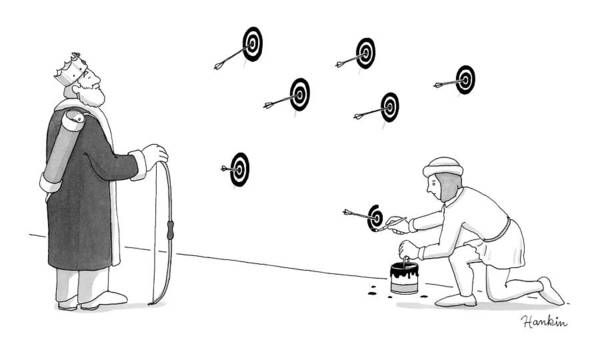
Many pro-Russian observers argue that the retreat from the North is a genius move: Russians are regrouping for a major assault in the East. That's not wrong. Indeed, Russians *will* attack in the East, in Donbass. However, these analysts seem to make virtue out of a necessity 

Russian retreat from the North doesn't look as a premeditated move. I don't have data but judging from the photos of abandoned Russian vehicles t.me/russian_losses they are fleeing leaving whatever that can't move fast: artillery, rocket launchers, air defense systems
How could it happen? To answer this question, we'll need to figure out how did the hostilities go *before* the Russian retreat. What territory did the Russians control? Analysts mocked such "just the roads" maps of Russian-controlled territory as an obvious pro-Ukrainian copium 

And yet, "just the roads" maps were quite accurate and the analysts were wrong. Strelkov debunks "contiguous territory" myth and argues that at least in the North Russians controlled only the "long narrow appendixes along the roads". Russian, indeed, controlled "just the roads"
According to Strelkov, Russians didn't control the territory between the northern highways and haven't isolated cities like Chernihiv and Sumy. Thus they risked repeating a scenario of the Winter War 1940 when much smaller Finnish forces isolated and decimated the Soviet invaders 
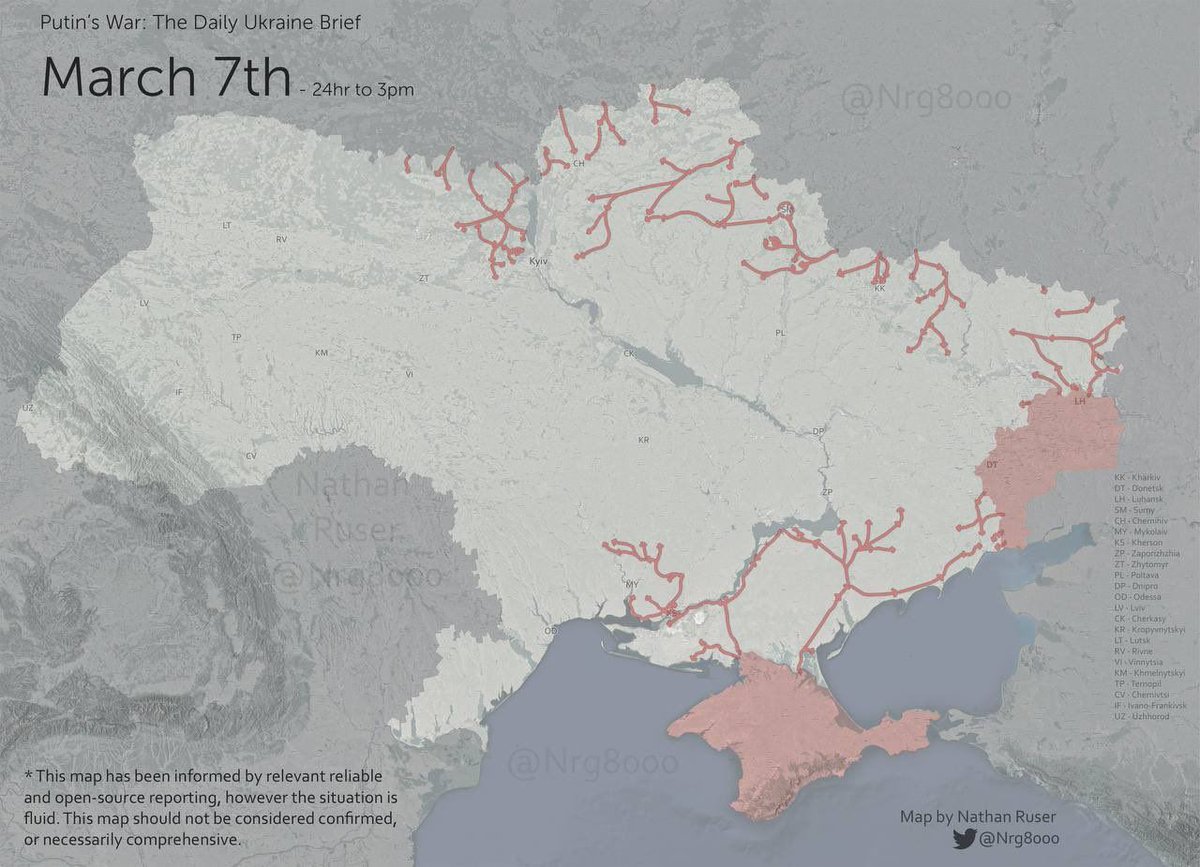
Finns destroyed the Soviet troops using guerilla tactics in winter. Ukrainians will soon have an advantage of using similar tactics in summer, during зеленка, "the green". Trees being covered with leaves will give an upper hand to the Ukrainian guerillas over the Russian regulars 

Strelkov concludes that Russians have no choice but to retreat from the North in order to regroup and attack again in Donbass
(you see Russians retreating from the Sumy area. On this northeastern direction Russian retreat seems to be more organised than in Kyiv or Chernyhiv)
(you see Russians retreating from the Sumy area. On this northeastern direction Russian retreat seems to be more organised than in Kyiv or Chernyhiv)
"But honestly I doubt that after losing the golden first month of the war, our troops will manage to surround and destroy the Ukrainian force in Donbass. Unfortunately I see that Ukrainian military commandment is acting an order of magnitude more competently than the Russian one" 

How could it happen? How could seemingly so much superior Russian army fail in Ukraine miserably? Of course, many argue it didn't fail at all. Coincidentally, those very people usually predicted a Ukrainian collapse within few days or weeks. Now they convenienty forgot it ofc 

The failure of many analysts to correctly predict the course of Z-war resulted from three factors. First, they greatly overestimated (or rather misunderstood) the Russian-Soviet army. Second, they underestimated the Ukrainian one. Third, they ignored the Russian political goals
Russian army is just superficially reformed Soviet army. And the Soviet army was a multitask tool designed for:
1. Winning the nuclear war
2. Picking potatoes
3. Pacifying satellite states
Consider that multitask tools are usually not *that* great in either of their functions
1. Winning the nuclear war
2. Picking potatoes
3. Pacifying satellite states
Consider that multitask tools are usually not *that* great in either of their functions
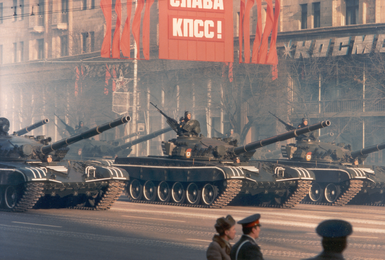
Soviet army was designed for the nuclear war. Thus all the army branches were developed for the war that would involve mass employment of nukes. Which is completely different from a conventional war. Let me illustrate this difference on example of a Soviet IFV - БМП-1 
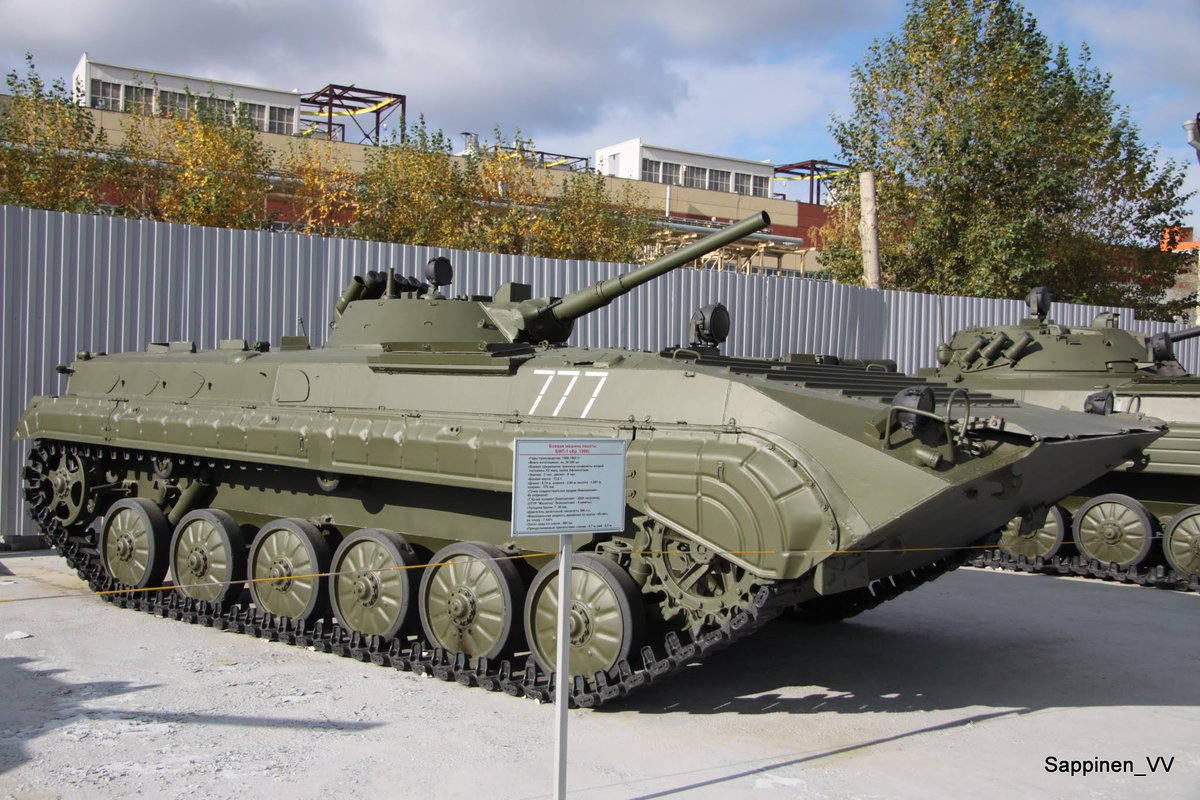
БМП-1 has been the most common IFV in the Soviet/Russian army. It also has been the most deeply hated one. While its abbreviation БМП means Боевая машина пехоты (Fighting vehicle of the infantry), frontline soldiers called it Братская могила пехоты (Mass grave of the infantry) 

Both in Afghanistan and in Chechnya soldiers preferred to ride on the armor rather than inside. Why? Well, the armor gave enough protection from light weaponry, especially from the front. But the armor on the sides was so weak that machines guns or shell fragments often broke it 

What is worse БМП-1 offered almost zero protection from the high explosive projectiles or from the land mines. In case of mine explosion, soldiers wouldn't be able to get out and would burn alive inside. Why? Largely because it was not ergonomic at all. It was incredibly cramped 

In the USSR they didn't care much about the ergonomics. And yet, a number of БМП-1's was acquired by the DDR and then inherited by the FDR. Germans tried to modernize it into BMP-1A1 Ost concentrating on safety and ergonomic qualities but couldn't improve the latter substantially 
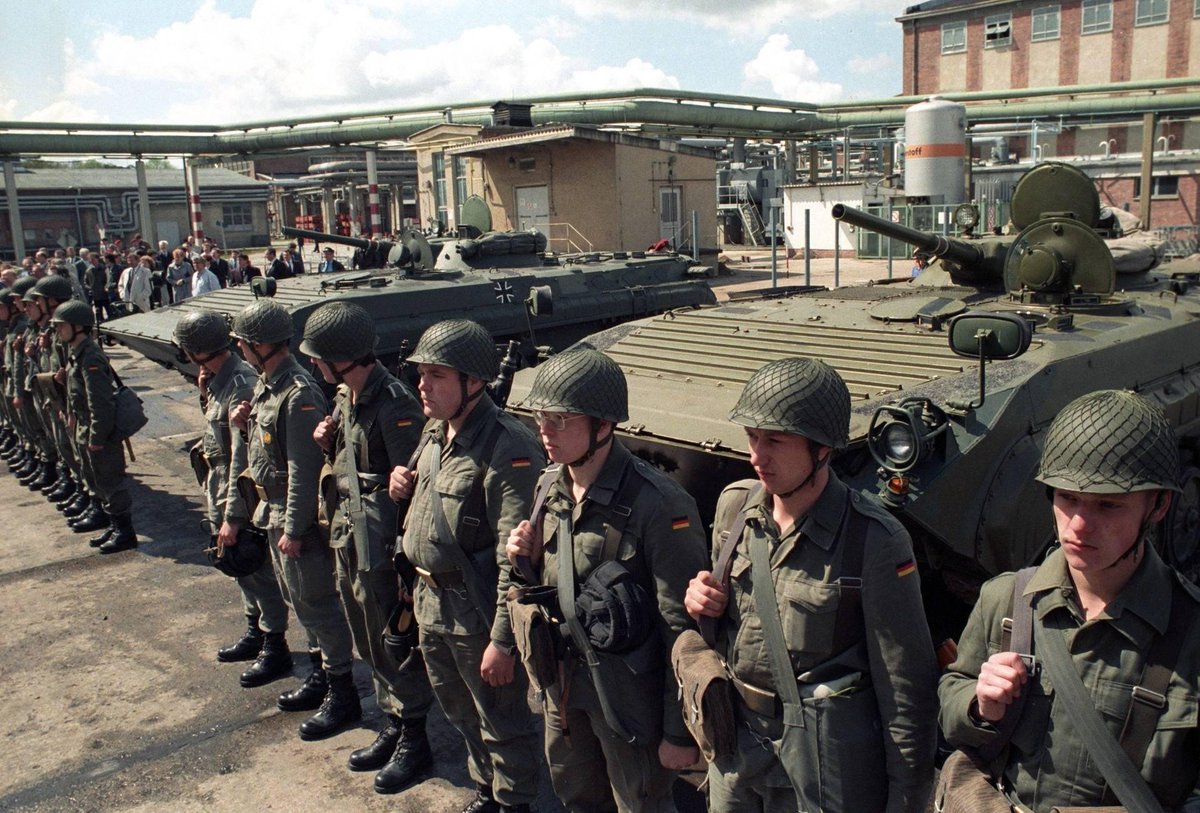
Now why would the Soviets develop and them mass produce such a vulnerable vehicle? Why did they build almost 20 000 of БМП-1? Well, because they prepared for the nuclear war and БМП-1 was specifically designed for it. For-nuclear war machine performed poorly in a conventional war 

Let's discuss Soviet nuclear war plans. Nuclear war had to be performed by the coordinated efforts of all the army branches. It had to commence with the strikes by the strategic nuclear weapons which would constitute "the main substance of the operation" 

However, after the strategic nuclear strikes, the army had to perform the land offensive and the VDV airborne operations. In conventional war, Soviet offensive had to be facilitated by the rolling barrage fire. In a nuclear war - by the rolling barrage fire with the tactic nukes 
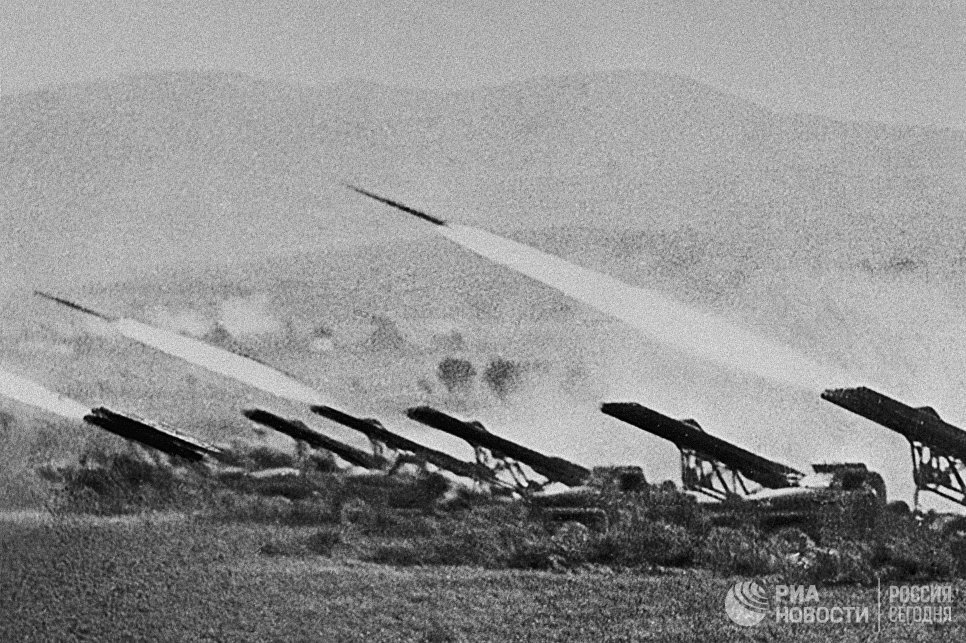
The rolling barrage fire is a moving wall of artillery fire (огневой вал) which destroys the enemy and acts as a defensive curtain for the land assault that follows behind. It was widely used in WWI, WWII and had to be used in WWIII, too, but now with the tactic nuclear weaponry 
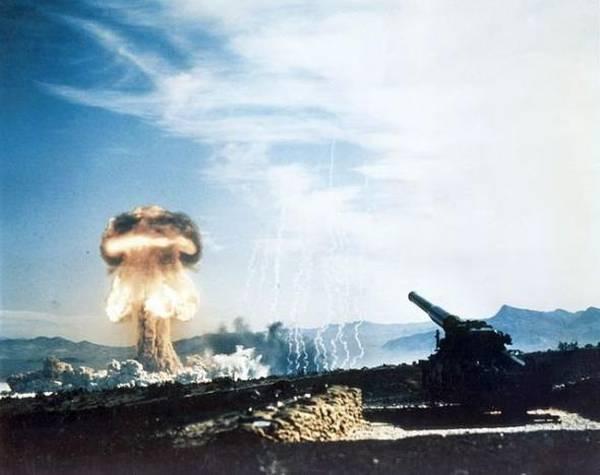
Soviets troops had to advance covered by the nuclear rolling barrage fire. Thus they were designed specifically to advance through the nuclear wasteland. БМП-1 had a lot of protection from the radiation. However, it carried little armor to be able to swim across the rivers 

Soviet troops had to advance through the nuclear wasteland with obliterated infrastructure. Thus vehicles had to bear a lot of radiation protection and little armour. There would be not much resistance in a nuclear wasteland anyway
(Soviets train to cleanse the radioactive dust)
(Soviets train to cleanse the radioactive dust)
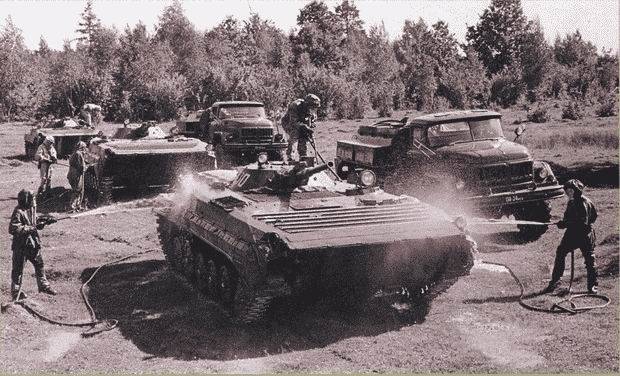
In a conventional war most Soviet advantages are useless. There's not much radiation there. And yet, weak armour *is* a huge drawback of for-nuclear-war vehicles thrown into a conventional war. Thus soldiers have to install handmade protection. See БМП-1 on Assad's service 
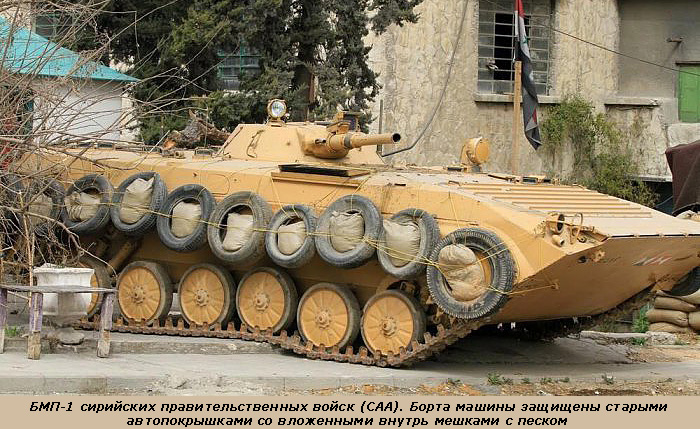
You can google tons of photos with the Russian vehicles using the same handmade installations to get *some* protection in Ukraine. This is a better designed one, you can see much worse installations on tanks and IFVs. Russians got into a conventional war they weren't prepared for 
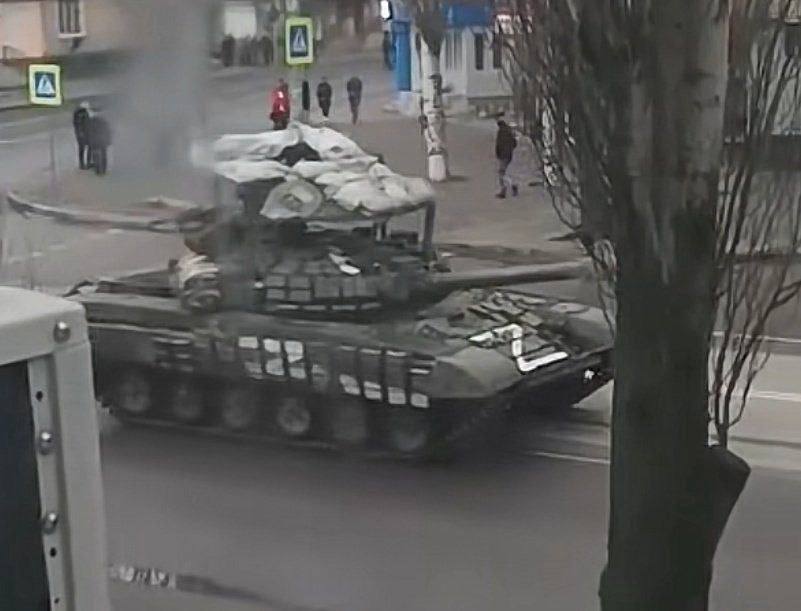
In a sense I find the fate of the Soviet/Russian army deeply poetic. It was designed for a nuclear war. They prepared for the nuclear Holocaust for decades and yet never had a chance to experience it. That reminds me of a certain Buzzati's plot of course 
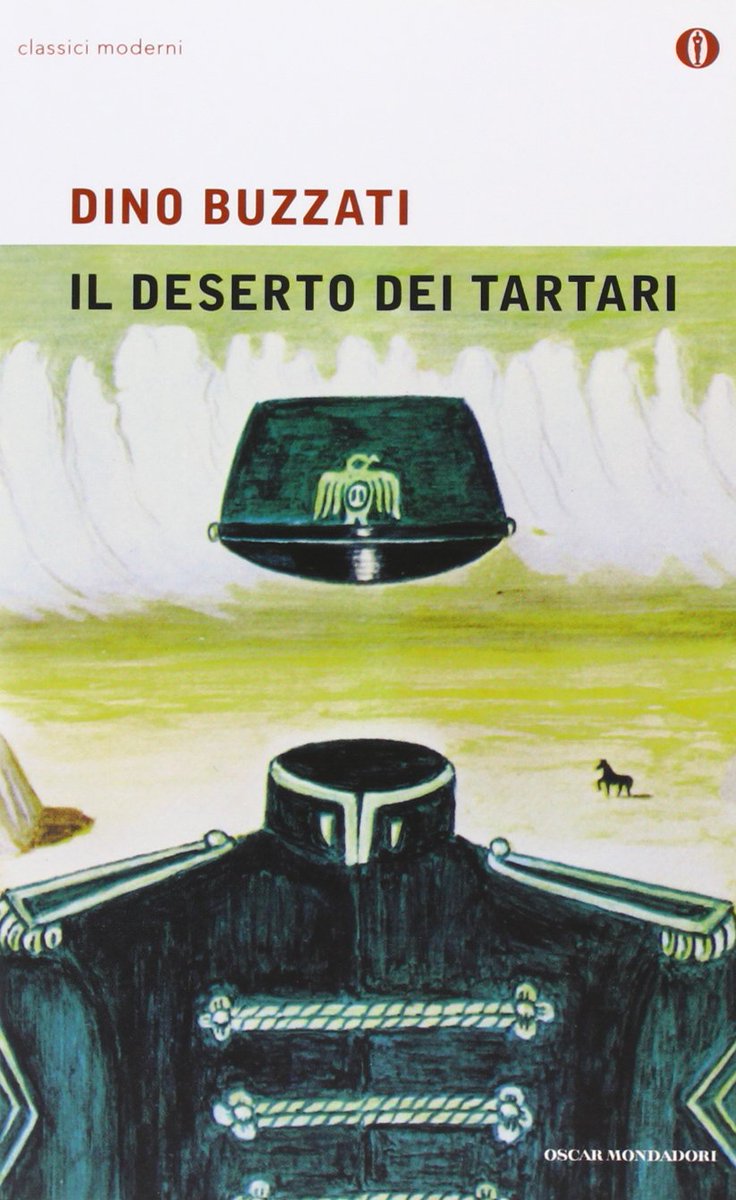
Apart from waging the nuclear war, Soviet army had other functions as well. One of them was - picking potatoes. I mean it both literally and metaphorically. The military had to fill any gaps in Soviet economy and in labor market they were ordered to fill. They would pick potatoes 
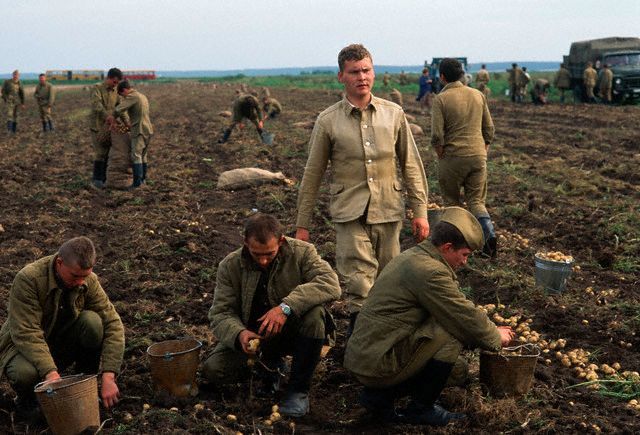
Since the spring till late autumn Soviet army was busy with agricultural works. They would plough, water, harvest on huge spaces from Siberia to Uzbekistan. Nobody could escape. Even so much glorified VDV stationed in Hungary had to work on Kuban fields
(soldiers harvesting hay)
(soldiers harvesting hay)
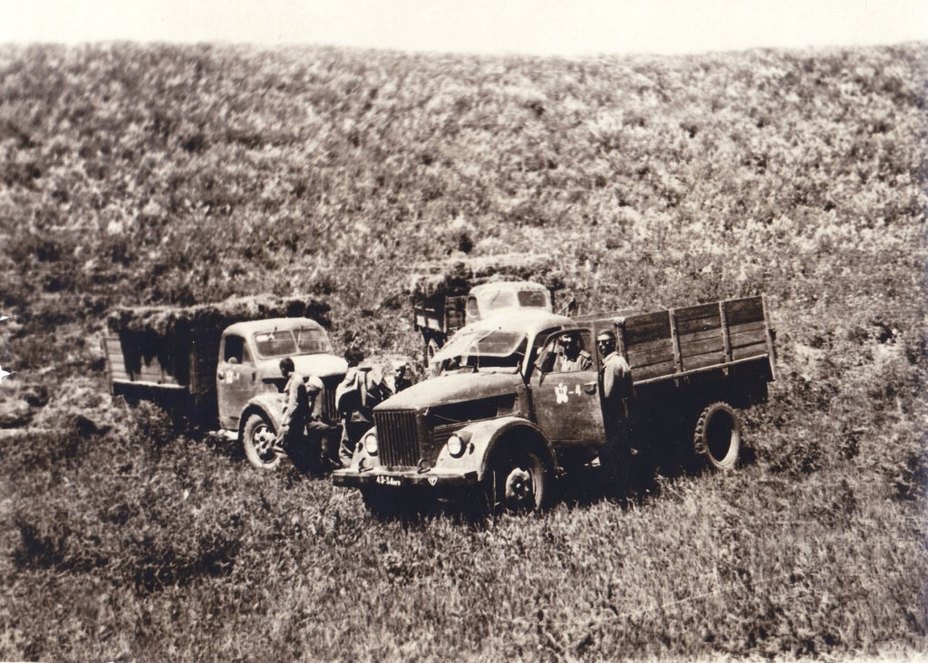
Nobody could escape agricultural wok. Nuclear rockets personal, Navy sailors, VDV, troops stationed in Europe all had to send their vehicles and men to the fields. In practical terms it meant that during the agricultural season Soviet military capacities were very low 

It influenced promotions, too. Since army had to toil on the fields, it is the good agricultural managers who were promoted instead of good officers. This also explains a strange inaction of the army during the fall of the USSR. It was August 1991 and much of it was on the fields 
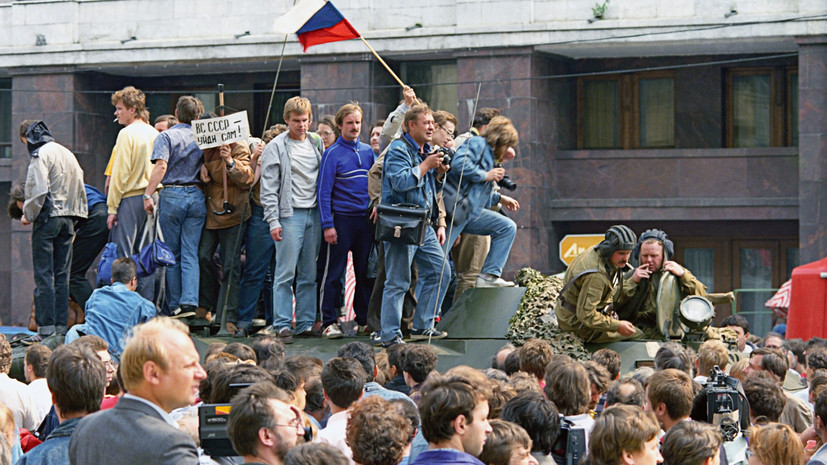
Finally, Soviet/Russian army had to perform pacifications in the satellite states. It gives context for the logic of Z-operation. It wasn't planned as a war. They designed it as a pacification modelled after the Operation Danube, 1968. Russian sources are quite open about it 
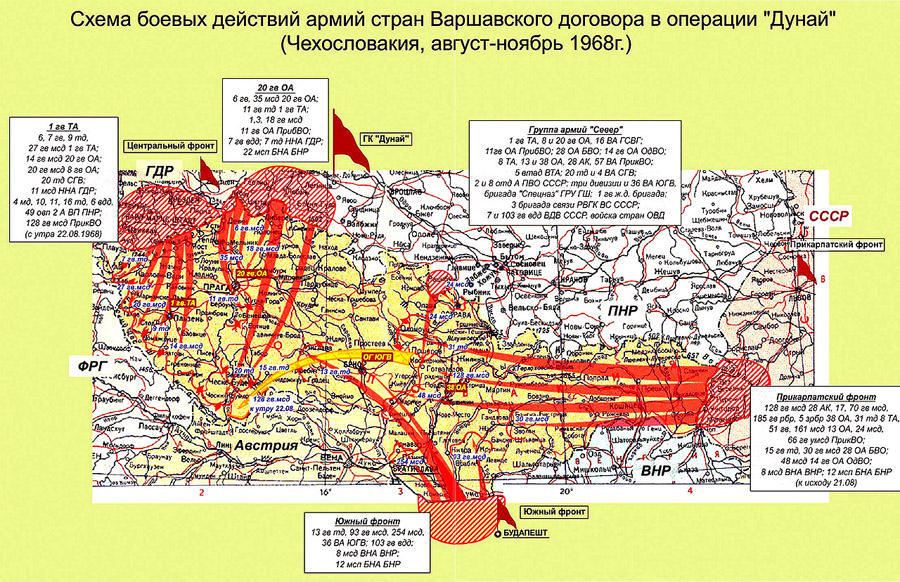
"Operation was designed as the Czechoslovakia-68. Enter from all directions, put the new government. It didn't work out. For an entire month we pretended everything's alright and tried to win with a small force not prepared for a full scale war on eight directions simultaneously" 

That was a quote by Dimitriev. Originally a pro-Russian Ukrainian he later fled to Russia and prepared a revanche. He was one of politruks who were following the Russian army and aimed to form a new administration of the country once Russians take over. Now he knows they failed 

While Russian observers are pretty open about Z-Operation being modeled after the Danube 1968, only few Western analysts that I know of openly refer to the Danube as a benchmark for Z-Operation. One of them is Edward Luttwak who predicted Russian failure exactly for that reason 
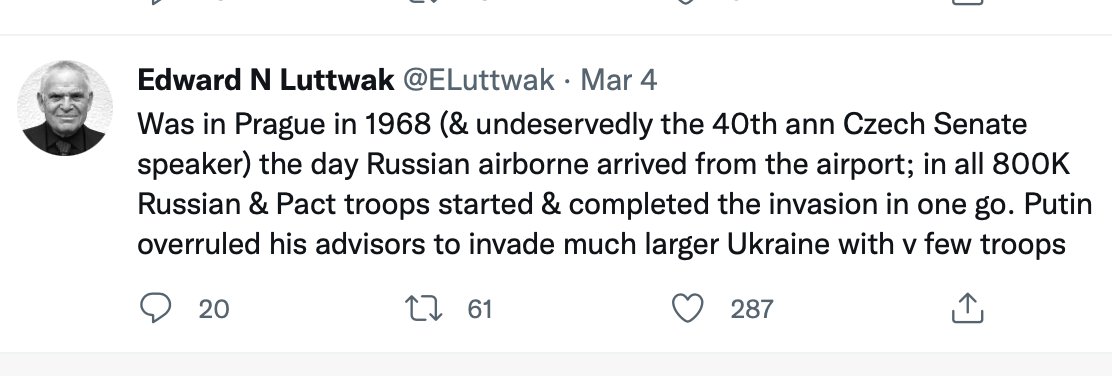
While Russia aimed for a quick victory in Ukraine, it wasn't planned to be a Blitzkrieg. It wasn't planned to be a war at all. It was a copypaste of "Danube" when USSR pacified the dissident Czechoslovakia and finished the Prague Spring. I mean it literally and not as a metaphor 
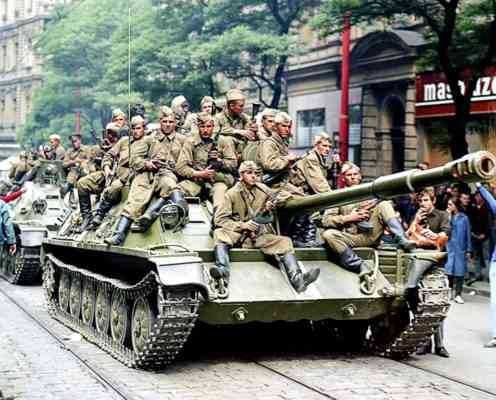
What is in common between Z-Operation and Danube? Well, first, their political goals. In both cases Moscow was discontent with the political leadership of an Eastern European country and with its too free and deregulated political life. That was unacceptable and had to be stopped 
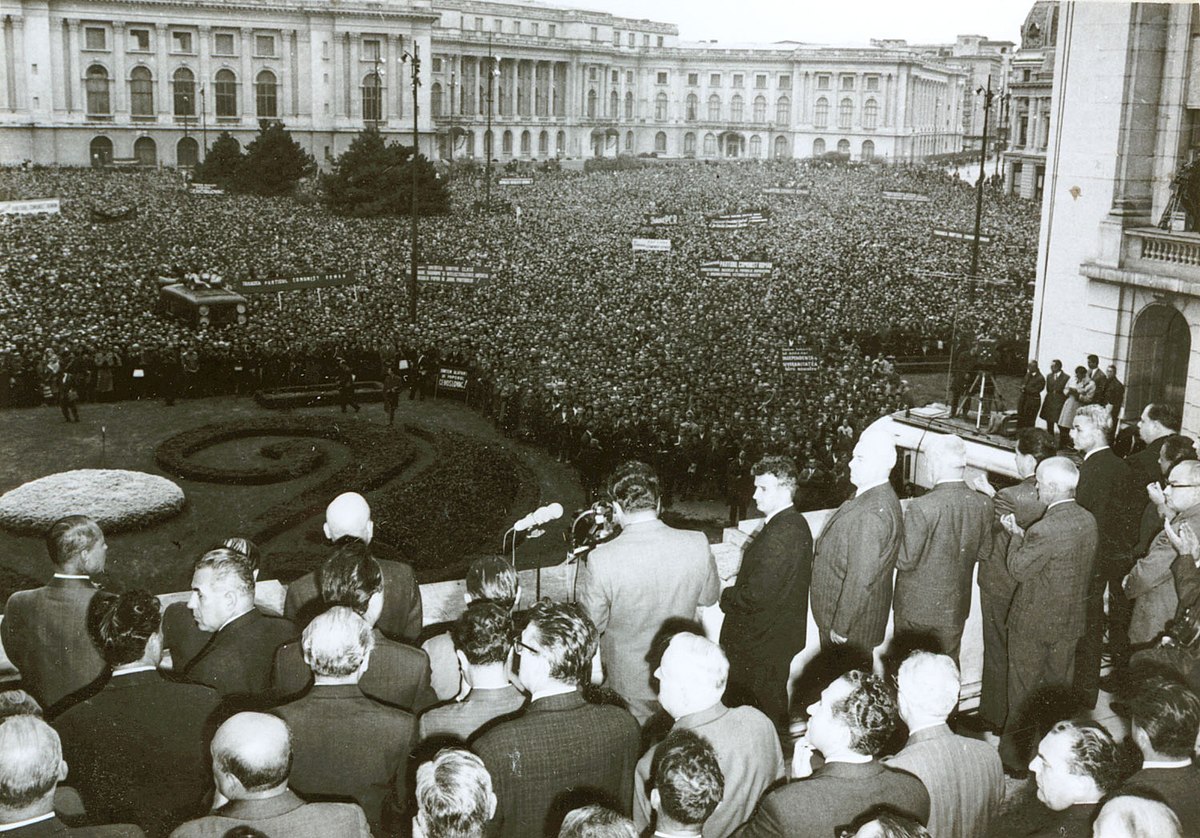
Both in Czechoslovakia and in Ukraine Moscow intended to stop "chaos" (=deregulated political life) in a perceived satellite state by force via a police operation. This police operation had to be conducted by the army but very quickly, with minimal resistance and minimal shooting 
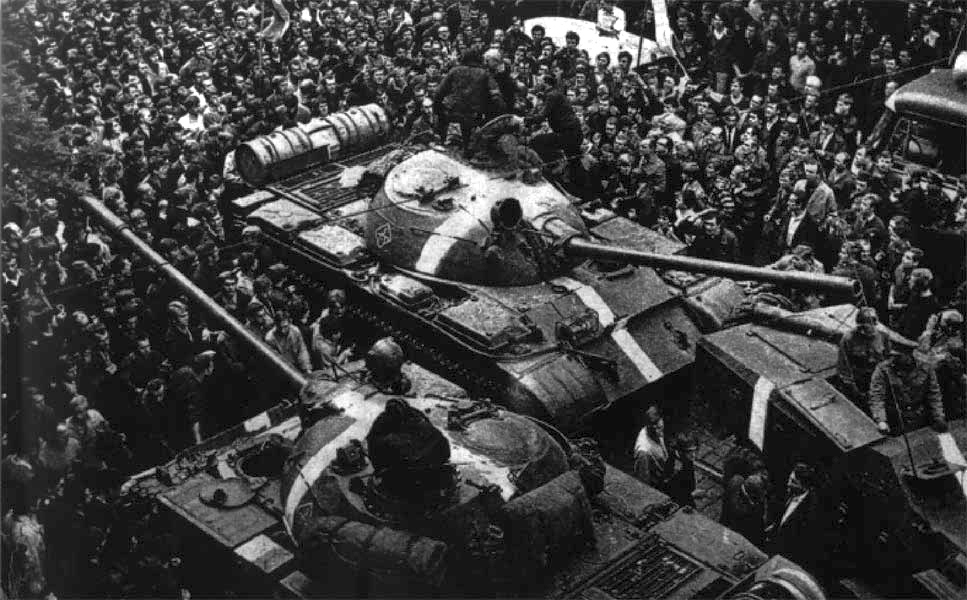
To minimise resistance your invasion should be unexpected. That's why preparation for invasion was both times disguised by "manoeuvres". Z-invasion - by "Union Resolve" in Belarus, "Danube" - by "Neman" manoeuvres which allowed to lowkey amass huge forces on Czechoslovak border 
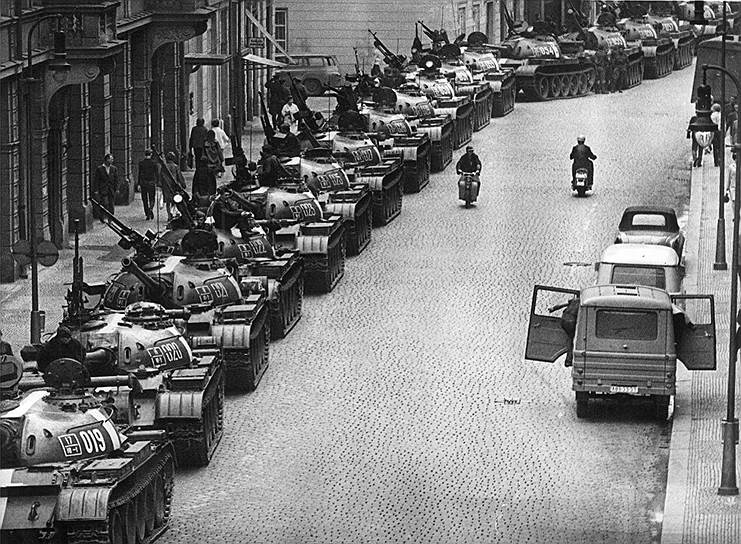
Both in 1968 and in 2022 soldiers didn't know where they're going. Even their commanders didn't know. Immediately before the invasion commanders received a radio command "Vltava-666" which meant they should unpack a sealed mail with a secret order and execute it immediately 
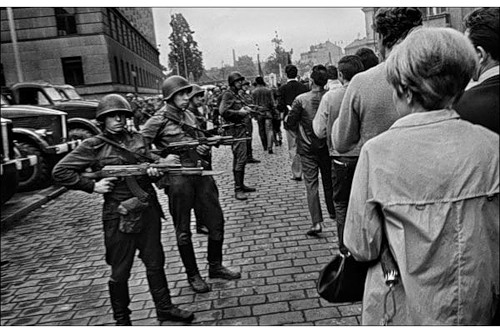
Both in Czechoslovakia 1968 and in Ukraine 2022 occupiers would have problems with distinguishing their vehicles from those of the occupied. Thus in 2022 they marked their vehicles with "Z", "V", "O" etc and in 1968 - with a white stripe. That was to distinguish *us* from *them* 



In Czechoslovakia they ordered to neutralize any local military vehicles without white stripes and to destroy them if they resisted. Meanwhile Soviets were absolutely prohibited from attacking NATO forces if they encounter them. It's likely similar instructions were given in 2022 
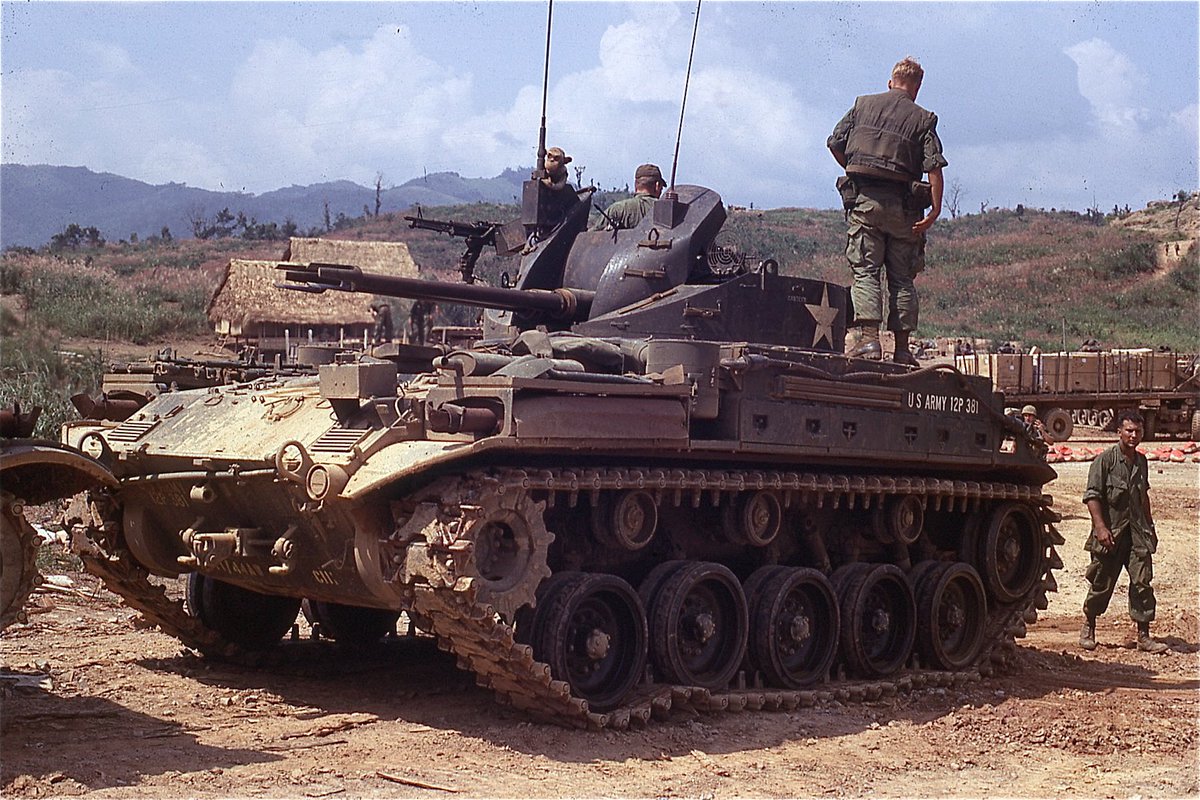
Both Danube and Z-operation started with VDV attacking airports. In 1968 a Soviet transport plane asked for emergency landing in Prague because of an "accident". They allowed it. Plane landed, VDV disembarked and captured the airport to allow other invaders to disembark smoothly 

Z-operation started in a very similar way. Operation started with bombings and with Russian VDV disembarking their paratroopers in key airports. Here you see them attacking Hostomel airport near Kyiv. And yet, here you see the major difference: Ukrainains immediately opened fire
That's the initial airborne attack on a Ukrainian airport from the Russian POV. As you see, on its initial stages Z-operation went similar to the Danube, just with massive use of transport helicopters: take control over the airports and them bring more troops by the air
But the air attack during Z-operation turned out much worse for Moscow than the Danube. Ukrainians were more prepared to face Russian VDVs. After all, paratroopers are essentially a glorified police force unable to stand against the regular army. No wonder they were destroyed
Although the land invasion 2022 was modelled after 1968, it was worse prepared. In 1968 Czechoslovakia was attacked by an enormous force of 500 000 coming in two echelons. First echelon of 250 000 pushes forward, second one come next, occupies territory and secures supply lines 
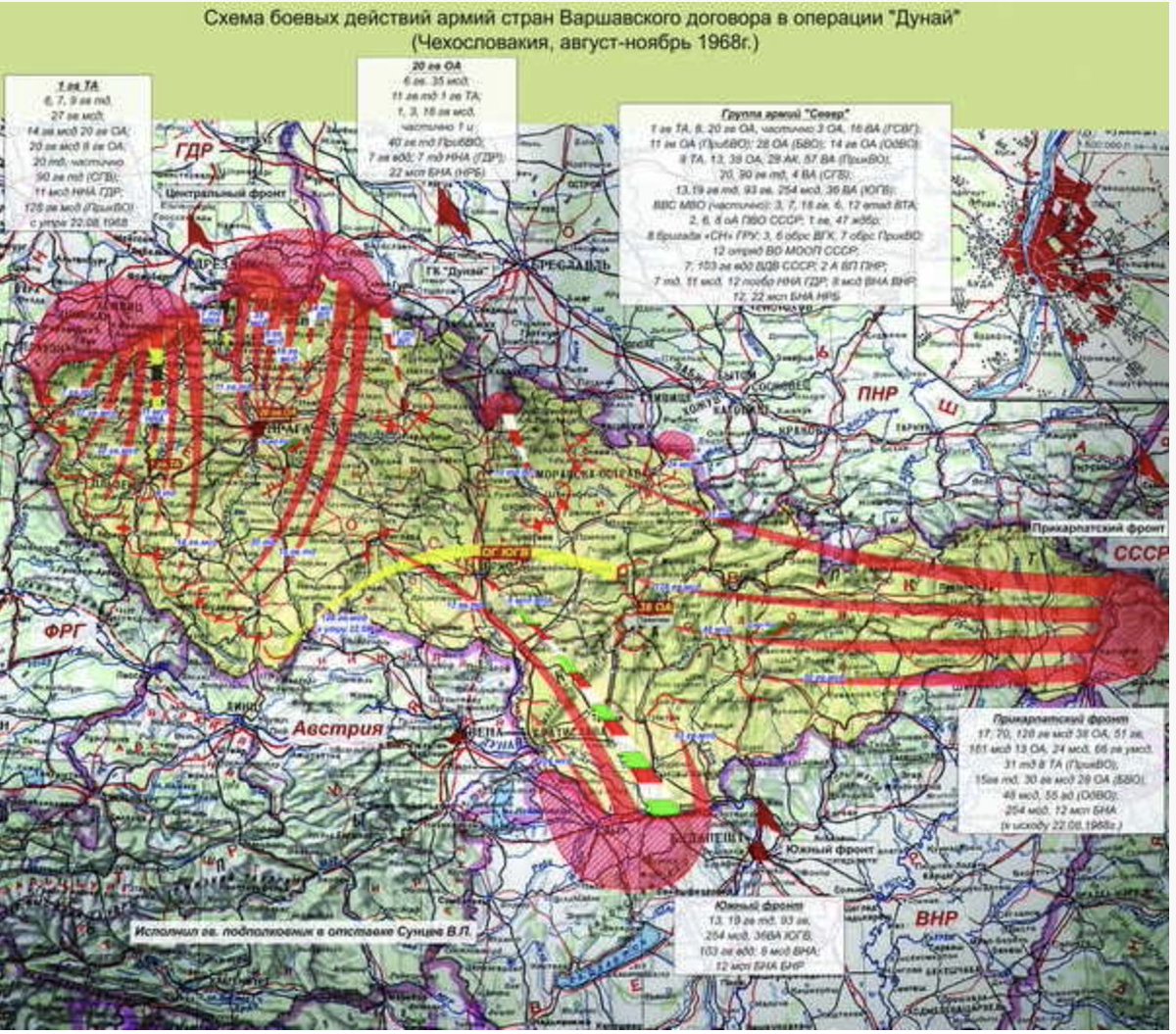
Z-invasion proceeded with far smaller force. Only 160-190 thousand Russian soldiers crossed the border with Ukraine in late Feb. Like in 1968, they pushed forward. But no second echelon came to occupy territory behind the first and secure the supply lines. Because it didn't exist 

Putin didn't expect resistance thinking Ukrainians would just run surrender. Putin and some Western analysts underestimated the cultural impact of Donbass catastrophe that obliterated pro-Russian sentiments in East Ukraine. Russian rule in Donbass turned out to be the nightmare 
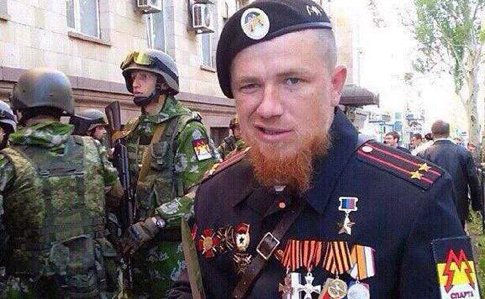
Even the Russian official propaganda admits that Russians misjudged the mass sentiments in Ukraine. They wrongly believed that Ukrainians are just Russians and Ukrainians independence is just farcical. Meanwhile, they unexpectedly met a bitter and determined resistance
Danube-styled invasion with much smaller force was a mistake. Why? Because Ukrainians saw it coming. They prepared for the guerrilla war and for operating in a deep rear of the enemy. The entire concept of territorial troops modelled after Poland was aimed to this type of war
Z-army pushing forward and leaving the unoccupied territory behind gave an opportunity to launch exactly that type of warfare Ukrainians had been preparing for. As a result they started a full scale guerrilla war ravaging Russian supply convoys and army columns. Watch this video:
Another surprise was how difficult it is to assault positions in cities and especially in industrial landscapes when their defenders are resolved to fight. Even extremely heavy bombardment leaves enough defenders alive to keep fighting. Mariupol proved that better than anything 

Russian sources give grim picture of the WWI-style war in East Ukraine. Z-forces do frontline attacks on fortified Ukrainian positions again and again. They suffer huge losses with almost no progress, but commanders keep sending them in frontline attacks. As Strelkov points out: 
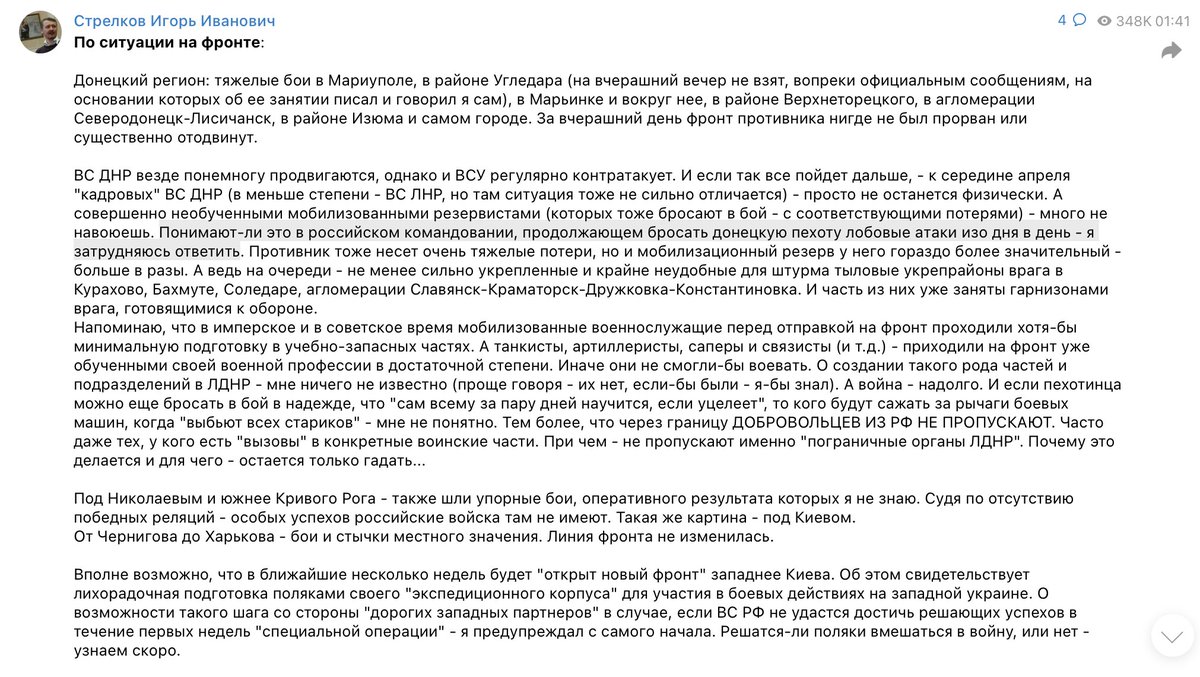
Now whom are Russians sending to these frontline attacks? Well, the Donbass people. They do "total mobilisation" in Donetsk and Luhansk and send these guys to frontline attacks. That's very smart. They're not Russian soldiers, so you can keep official casualty numbers low
Btw: that's how the Donbass levy looks like. These miserably looking guys bear the main burden of war in the East from the Russian side. Compare them with the heavily equipped Kadyrov's TikTok soldiers. NB: Those who look great do not fight, those who do fight, do not look great 

The might of the Russian army had been wildly overestimated. Meanwhile the strength of the Ukrainian one was just as wildly underestimated. Even Strelkov grudgingly admitted that "Ukrainian military commandment is acting an order of magnitude more competently than the Russians" 
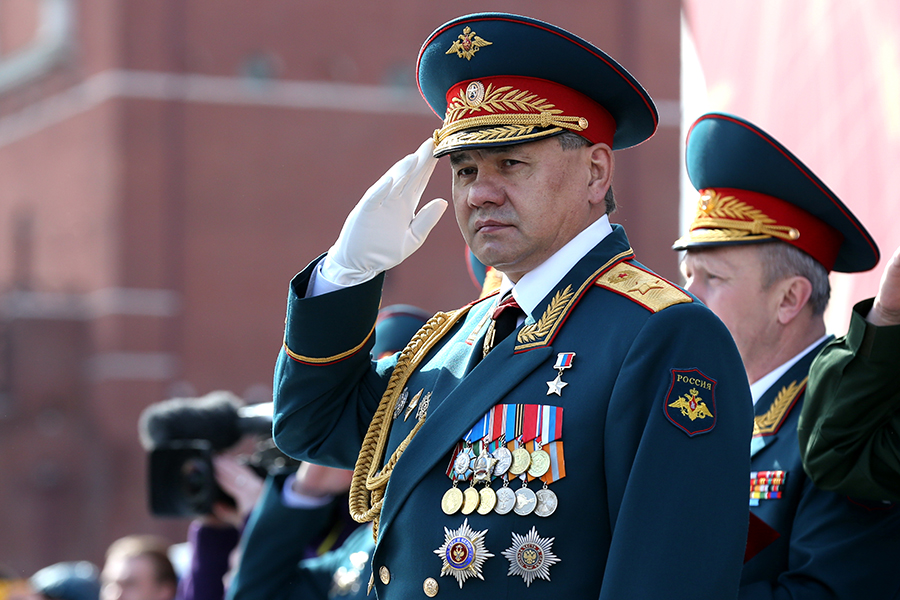
Consider a case when two Ukrainian helicopters evacuating the wounded from besieged Mariupol were shot down by Russians. Russian sources suggest that this evacuation wasn't incidental. Ukrainians had been systematically supplying the besieged city by air, unnoticed by Russians 
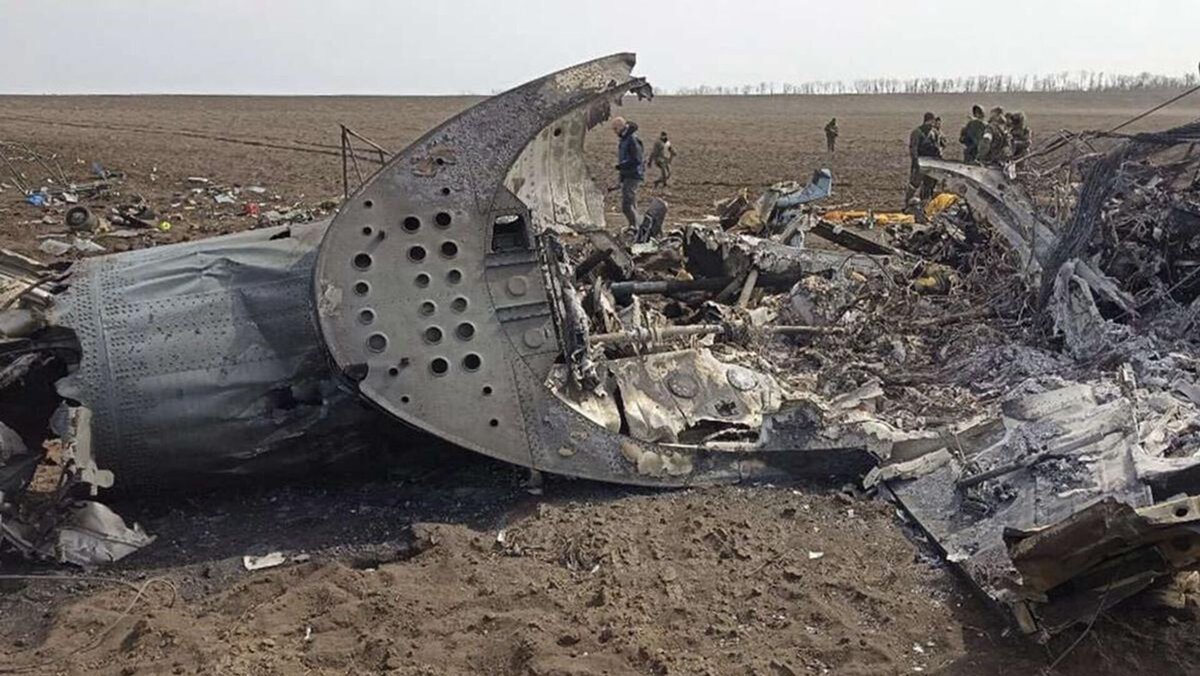
"They had an established route unnoticed by our air Defense. They were brining ammo to Mariupol and the wounded from it. They were flying on a miminal height around 10 meters. They were avoiding settlements, turning to the Above sea and then to the Mariupol seaport"
"They could bring up to 12 tons of ammo when going to Mariupol and evacuate up to 60 wounded soldiers on a way back. We don't know how many times did they repeat it. This time they were unlucky to accidentally meet a patrol with a man-portable air-defence system on a way back"
Sounds crazy, doesn't it? If true, it suggests extremely high level of both competence and morale, far exceeding the one that can be found within the Russian army. It means that the Ukrainians went through a fundamental reform since 2014 - and [almost] nobody managed to notice it
In fact, we do have the indirect evidence that this account of how the besieged Mariupol had been supplied is probably true. Consider this record of two Ukrainian helicopters going to attack the Russian oil depot in Belgorod on a very low height
Watch another record of the Ukrainian strike on the oil depot located in Russia proper. The fact that two Ukrainian helicopters managed to sneak to Russia undetected by any air defence systems had a profound effect on Russian public opinion
Consider this chat with reactions on the attack on Belgorod. It's not representative ofc, but shows how the Russian public consciousness works:
"It seems we need to negotiate and withdraw the troops. Forces are equal, futher hostilities will add more sanctions and casualties"


"It seems we need to negotiate and withdraw the troops. Forces are equal, futher hostilities will add more sanctions and casualties"


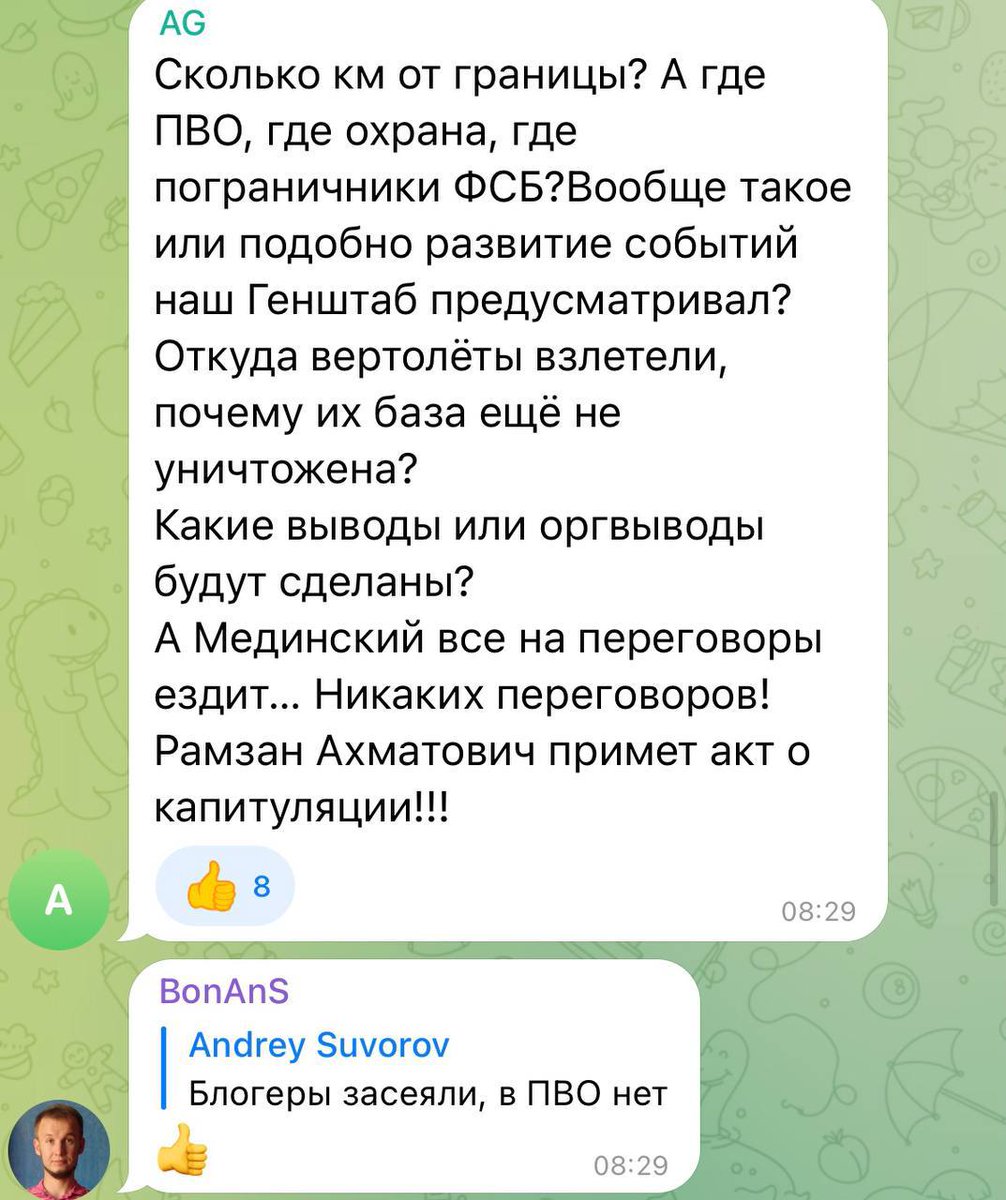
Ukraine clearly punches above its weight. It has a competent and high morale infantry that holds its ground against the Russian artillery-centric army. It has aviation that supplies a besieged city unnoticed by the Russians and manages to attack Russia proper
Finally, Ukraine had a military commandment that not only knew about the impending Russian invasion but also correctly predicted how it would proceed (based on Soviet models ofc) and prepared the effective countermoves that Russians didn't anticipate
Retrospectively it all makes sense. Ukrainians suffered painful defeats in 2014 but were not destroyed. And whatever doesn't kill you makes you stronger. Nothing sparks institutional evolution so much as a humuliating defeat and an existential threat that didn't break your spine
Again, retrospectively speaking, the weakness of the Russian army makes total sense. Why Russia can't have as good infantry as Ukraine? Largely because such an infantry would pose a political threat to the Kremlin. Putin wouldn't allow competent high morale infantry to emerge
The poor quality of intelligence Putin had been getting on Ukraine (=they're all pro-Russian), his overestimation of Russian military capacities, make sense, too. Subordinates avoid reporting bad news to a dictator and tell him whatever he wants to hear. He's in a total bubble
The problem of poor poor feedback goes beyond the dictatorship vs democracy dichotomy. Much of misinformation results simply from the esprit de corps. Career officers don't question the established order and doctrine much and ofc defend them from being questioned by the laymen
Analysts noticed the highly specialised & professionalized character of the Russian army in comparison with Ukrainian (or the American) one. However, they usually uncritically presumed this to be a comparative advantage of the Russian army. But what if it's the other way around?
What if the supposed advantages of the Russian military are in fact its disadvantages? Why do we presume that its insectoid specialisation, excessive professionalism and credentialism are necessarily an institutional advantage?
What if we overestimate Russian army simply because it is not being questioned by the laymen? American military machine for example is being constantly criticised by the media, think-tanks and the expertocracy which is only partially comprised by the (former) career officers
Russian military doesn't have a channel for a negative feedback by outsiders. Of course, Russia has supposedly independent institutions that have to analyse its military capacities. But they aren't independent. Almost everyone who works there is a current of former career officer
This might explain why analysts overrated the Russian army so much. Russian army lived in a constant positive feedback loop with career officers congratulating other career officers with their amazing performance. Its weaknesses were unnoticed until the Ukrainian war started
Rule of thumb. If an institution has too high reputation that can be a sign of weakness. Perhaps it exists in a constant positive feedback loop. In the absence of major failures it may accumulate negative mutations that remain unnoticed until a major catastrophe that destroys it
But how can people form *within* an institution all keep omerta and not disclose how badly it is doing in reality? Well, for two reasons. First of all, it is the esprit de corps and mutual responsibility. Nobody is really interested in the negative PR
We all know that architects build stuff primarily to impress other architects, academicians write stuff to impress other academicians and such a situation is typical for almost any professional corporation. But why do we think that the military would function any differently?
What if in the absence of an outside control by the laymen the military would work in a similar way as other professional corporations? Officers aim to impress other officers (and generals!) while public criticism of the army will hardly gain you sympathisers among the military
Of course, individual officers might have quite an accurate information of how badly it's going on their specific direction of work. And yet, they would wrongly presume that in the other army branches and institutions they must be doing better. That reminds me of a certain joke
Villagers decided to fill a barrel of vodka for a feast, so everyone had to contribute a bottle, pouring it into the barrel. Everyone realised: if I pour a bottle of water, it won't be noticed. So in the end they collected a huge barrel of water with zero vodka percentage
It is striking how much did the Western analysts overestimate the Russian army. It's even more striking how deeply did they underestimate the Ukrainian one. The Ukrainian military evolution since 2014 went almost completely unnoticed by the world. End of🧵
I didn't realise that my DMs had been closed and thus I missed a few people who wanted to contact me. I am sorry for it, that was unintended, as a lot of personal messages were buried in the comments. I opened DMs and will be regularly checking messages in the coming days
• • •
Missing some Tweet in this thread? You can try to
force a refresh





